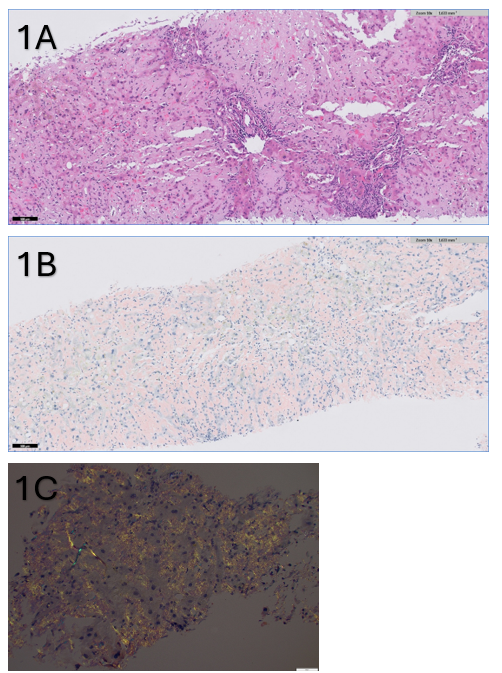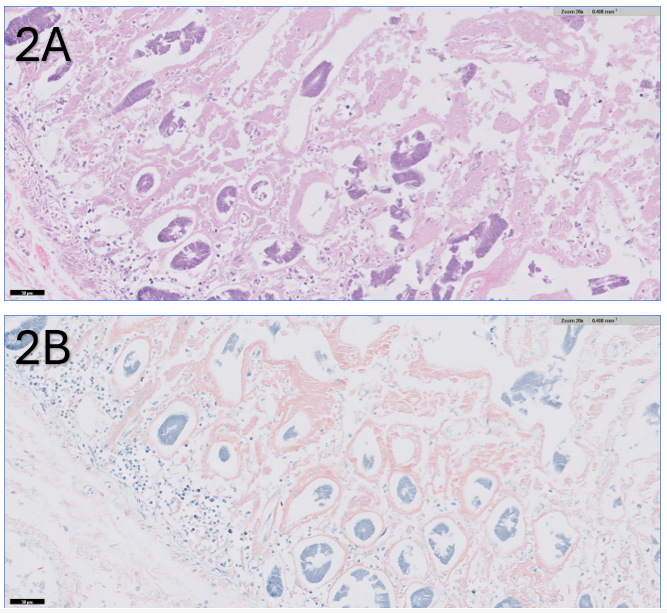Sunday Poster Session
Category: Liver
P1692 - Acute Liver Failure Secondary to Hepatic AL Amyloidosis Initially Presenting With Chronic Diarrhea
Sunday, October 26, 2025
3:30 PM - 7:00 PM PDT
Location: Exhibit Hall
- CH
Colton J. Hartig, MD (he/him/his)
University of Kentucky
Lexington, KY
Presenting Author(s)
Colton J. Hartig, MD, Annabel K. Moore, MD, Robin Faulkner, DO, Benjamin Cushing, MD, Justin Rueckert, DO, Seth Richardson, MD, Christina Delacruz Leyson, MD
University of Kentucky, Lexington, KY
Introduction: Light-chain (AL) amyloidosis is characterized by the accumulation of clonal proteins in tissues. This is often secondary to an underlying clonal plasma cell neoplasm and can present with an array of symptoms based on the affected organ system. Symptomatic intestinal and hepatic amyloidosis resulting in acute liver failure are exceedingly rare presentations of AL amyloidosis.
Case Description/
Methods: A 53-year-old male with a history of hypertension and hyperlipidemia initially presented to an outside facility reporting 1 month of watery diarrhea. There he underwent a colonoscopy with endoscopic findings suggestive of Mayo 1 Ulcerative Colitis. He was discharged on a steroid taper but returned to our facility 2 days later with persistent symptoms. Exam showed intact mentation and scleral icterus without stigmata of chronic liver disease. Notable laboratory studies included INR 3.2, alkaline phosphatase 158, AST 208, ALT 139, total and conjugated bilirubin 5.5 and 4.2 respectively. His colonoscopy pathology report from the outside institution returned as collagenous colitis. Imaging with computed tomography and magnetic resonance were inconclusive so he underwent liver biopsy which revealed hepatic amyloidosis (figure 1). He then decompensated with encephalopathy and shock of unclear etiology. While in the intensive care unit he underwent bone marrow biopsy revealing a hypercellular marrow and underlying plasma cell neoplasm. He had progressive renal and hepatic failure despite supportive care and ultimately died on day 13 of hospitalization. His final diagnosis was systemic AL amyloidosis secondary to kappa-restricted plasma cell neoplasm. Autopsy confirmed multi-organ amyloid infiltration with involvement of the colon (figure 2).
Discussion: Histopathologic involvement of the gastrointestinal tract in patients with AL amyloidosis is common. However, symptomatic intestinal and hepatic amyloidosis remain rare manifestations of disease and often go clinically unnoticed. Patients may present with non-specific changes in bowel habits and hepatomegaly. Serologic abnormalities including elevations in alkaline phosphatase may be seen. In few cases, AL amyloidosis has been reported as a cause of acute liver failure. The unifying diagnosis in our patient represents a unique presentation and progression of this insidious disease. To date, it is the only reported case in the literature of rapidly progressive acute liver failure secondary to hepatic amyloidosis presenting with chronic diarrhea.

Figure: Figure 1. Liver biopsy. Antemortem liver biopsy shows the replacement of the majority of the liver parenchyma by sinusoidal deposition of pink amorphous material with H&E stain (1A). The amorphous material is stained salmon-pink by Congo Red, consistent with amyloid (1B). Viewing the Congo Red-stained slide under polarized light reveals yellow-green birefringence, confirming the diagnosis (1C).

Figure: Figure 2. Postmortem colon microscopic examination. Microscopic examination of the colon sampled at autopsy revealed marked autolysis with areas of pink, amorphous material with H&E stain (2A). The amorphous material is stained salmon-pink by Congo Red, consistent with amyloid (2B).
Disclosures:
Colton Hartig indicated no relevant financial relationships.
Annabel Moore indicated no relevant financial relationships.
Robin Faulkner indicated no relevant financial relationships.
Benjamin Cushing indicated no relevant financial relationships.
Justin Rueckert indicated no relevant financial relationships.
Seth Richardson indicated no relevant financial relationships.
Christina Delacruz Leyson indicated no relevant financial relationships.
Colton J. Hartig, MD, Annabel K. Moore, MD, Robin Faulkner, DO, Benjamin Cushing, MD, Justin Rueckert, DO, Seth Richardson, MD, Christina Delacruz Leyson, MD. P1692 - Acute Liver Failure Secondary to Hepatic AL Amyloidosis Initially Presenting With Chronic Diarrhea, ACG 2025 Annual Scientific Meeting Abstracts. Phoenix, AZ: American College of Gastroenterology.
University of Kentucky, Lexington, KY
Introduction: Light-chain (AL) amyloidosis is characterized by the accumulation of clonal proteins in tissues. This is often secondary to an underlying clonal plasma cell neoplasm and can present with an array of symptoms based on the affected organ system. Symptomatic intestinal and hepatic amyloidosis resulting in acute liver failure are exceedingly rare presentations of AL amyloidosis.
Case Description/
Methods: A 53-year-old male with a history of hypertension and hyperlipidemia initially presented to an outside facility reporting 1 month of watery diarrhea. There he underwent a colonoscopy with endoscopic findings suggestive of Mayo 1 Ulcerative Colitis. He was discharged on a steroid taper but returned to our facility 2 days later with persistent symptoms. Exam showed intact mentation and scleral icterus without stigmata of chronic liver disease. Notable laboratory studies included INR 3.2, alkaline phosphatase 158, AST 208, ALT 139, total and conjugated bilirubin 5.5 and 4.2 respectively. His colonoscopy pathology report from the outside institution returned as collagenous colitis. Imaging with computed tomography and magnetic resonance were inconclusive so he underwent liver biopsy which revealed hepatic amyloidosis (figure 1). He then decompensated with encephalopathy and shock of unclear etiology. While in the intensive care unit he underwent bone marrow biopsy revealing a hypercellular marrow and underlying plasma cell neoplasm. He had progressive renal and hepatic failure despite supportive care and ultimately died on day 13 of hospitalization. His final diagnosis was systemic AL amyloidosis secondary to kappa-restricted plasma cell neoplasm. Autopsy confirmed multi-organ amyloid infiltration with involvement of the colon (figure 2).
Discussion: Histopathologic involvement of the gastrointestinal tract in patients with AL amyloidosis is common. However, symptomatic intestinal and hepatic amyloidosis remain rare manifestations of disease and often go clinically unnoticed. Patients may present with non-specific changes in bowel habits and hepatomegaly. Serologic abnormalities including elevations in alkaline phosphatase may be seen. In few cases, AL amyloidosis has been reported as a cause of acute liver failure. The unifying diagnosis in our patient represents a unique presentation and progression of this insidious disease. To date, it is the only reported case in the literature of rapidly progressive acute liver failure secondary to hepatic amyloidosis presenting with chronic diarrhea.

Figure: Figure 1. Liver biopsy. Antemortem liver biopsy shows the replacement of the majority of the liver parenchyma by sinusoidal deposition of pink amorphous material with H&E stain (1A). The amorphous material is stained salmon-pink by Congo Red, consistent with amyloid (1B). Viewing the Congo Red-stained slide under polarized light reveals yellow-green birefringence, confirming the diagnosis (1C).

Figure: Figure 2. Postmortem colon microscopic examination. Microscopic examination of the colon sampled at autopsy revealed marked autolysis with areas of pink, amorphous material with H&E stain (2A). The amorphous material is stained salmon-pink by Congo Red, consistent with amyloid (2B).
Disclosures:
Colton Hartig indicated no relevant financial relationships.
Annabel Moore indicated no relevant financial relationships.
Robin Faulkner indicated no relevant financial relationships.
Benjamin Cushing indicated no relevant financial relationships.
Justin Rueckert indicated no relevant financial relationships.
Seth Richardson indicated no relevant financial relationships.
Christina Delacruz Leyson indicated no relevant financial relationships.
Colton J. Hartig, MD, Annabel K. Moore, MD, Robin Faulkner, DO, Benjamin Cushing, MD, Justin Rueckert, DO, Seth Richardson, MD, Christina Delacruz Leyson, MD. P1692 - Acute Liver Failure Secondary to Hepatic AL Amyloidosis Initially Presenting With Chronic Diarrhea, ACG 2025 Annual Scientific Meeting Abstracts. Phoenix, AZ: American College of Gastroenterology.
